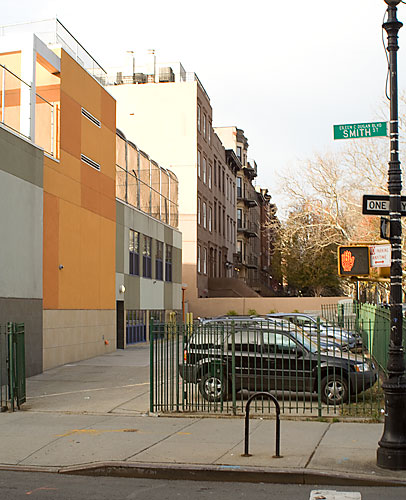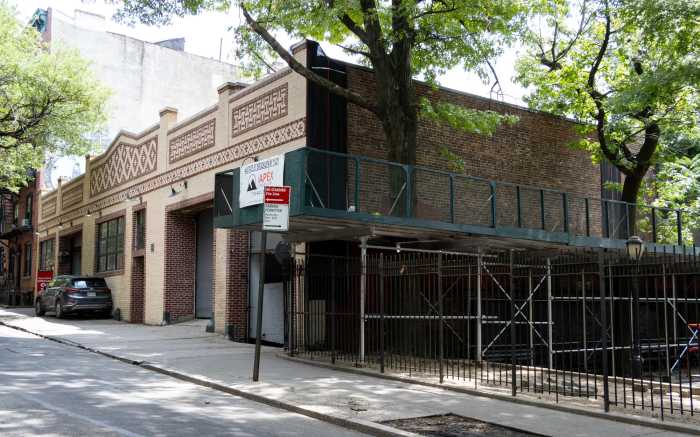Outgoing Councilman Bill DeBlasio has backtracked on his secretive effort to allow a politically connected private school to move ahead with a two-story extension atop of the courtyards that give Carroll Gardens is very character.
DeBlasio’s initial effort to insert an exemption for the Hannah Senesh School into a city administrative code was immediately discovered by local preservationists and bloggers last week, prompting the kind of outrage typically reserved for large-scale development projects, not a two-story addition atop a school parking lot.
But the parking lot in question, along First Place at the corner of Smith Street, is not merely a piece of city-owned land, but an architectural feature that is fundamental to the neighborhood. Indeed, such deep lots along First though Fourth places are what give Carroll Gardens its name.
After widespread complaints that DeBlasio’s exception would set a dangerous precedent, the Councilman, who becomes the public advocate on Jan. 1, withdrew his amendment.
“I’m pleased to report that Councilman DeBlasio agreed to hold off on the amendment,” DeBlasio’s successor, Councilman-elect Brad Lander, announced at a meeting at the Hannah Senesh School on Monday night, winning one of his first semi-official rounds of applause from the crowd of 50.
The exemption that would have laid the groundwork for an extension at the school will now be taken up as part of the normal public process that accompanies any request for a land-use change.
Former Councilman Ken Fisher, now a lobbyist, estimated that the new proposal would be prepared within three months.
Lander said that he supported that approach.
“I believe that the Council should not remove the courtyard requirement in the next few weeks, in a process that would not include community hearings, a vote of the Community Board, or the disclosure of [the land-use review procedure,” he said. “Instead, the proposed actions should be considered together through the [procedure], which provides a full public-review process with full disclosure, review of environmental impact, community hearings, and recommendations the community board, Borough President, and City Planning Commission before a vote by the City Council.”

But winning the battle did not calm many angry locals at Monday night’s meeting. After all, the “battle” has only begun.
That much was clear as architect Larry Horowitz passed around a rendering of the proposed addition. Many in the audience did not bother to hide their revulsion.
“The proposed building is hideous,” said Barbara Brookhart, a member of the Carroll Garden Neighborhood Association. “We’re all pretty upset by this.”
Ever the old hand, Fisher directly addressed the most-irritated in the audience, denying that DeBlasio’s amendment or that the development itself would set a precedent that would lead to further developments on residential courtyards, which are zoned as part of the street due to an odd regulation signed into law in the mid-19th century.
“If DeBlasio believed this would have opened the gates of hell, he wouldn’t have considered it,” Fisher said, hailing DeBlasio’s leadership last year in fighting for the protection of the neighborhood’s unique streets.
Since then, however, Fisher was hired by the school and DeBlasio collected nearly $700 in campaign contributions for his public advocate run from an official with the institution — further fueling some audience members’ feeling of a “betrayal” as Brookhart called it.
On Monday night, officials from the school mostly let Fisher do the talking, but Amy Glosser, vice chair of the board, emphasized her Jewish school’s connection to the community and the need for more space in its two-year-old building.
“We need room for a full-sized gym, a computer room, or a theater,” she said. “We certainly need more classrooms.”
Later, she added, “This is about getting better, not getting bigger.”


























